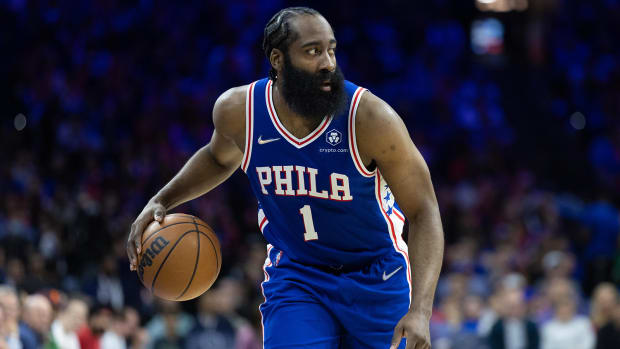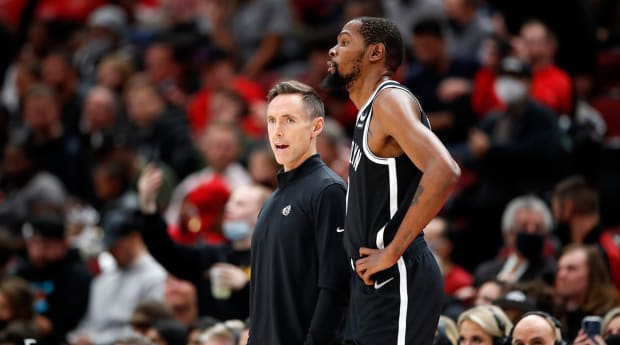With the Raptors gaining momentum against the 76ers, if ever there was a perfect time for him to take over and dominate, it might be now.
Hours before Game 5 of the Raptors-Sixers series began last night, Philadelphia guard James Harden walked into the Wells Fargo Center wearing a green-camouflaged outfit from his collar all the way down to his navy green boots.
With Harden blending in with the greenery surrounding the arena, the Sixers’ Twitter account used the photo of the nine-time All-Star and former MVP. “Where is @JHarden13¿” it asked.
The tweet, and its question, would turn out to be almost too on the nose just hours later.
Philadelphia dropped Game 5 to the Raptors at home Monday, 103–88, leaving coach Doc Rivers and the Sixers with an uncomfortable 3–2 edge in a series they previously led 3–0 against a Toronto club that’s playing without its All-Star point guard. Harden, in particular, was nowhere to be found, with 15 points, 7 assists and 5 turnovers on 4-of-11 shooting—the fourth time in five contests the floor general has connected on worse than 40% of his shots.
After the defeat, franchise player and MVP candidate Joel Embiid said what’s been plainly obvious to just about everyone throughout the series. “I mean, I’ve been saying all season since he got here: He needs to be aggressive and he needs to be himself. That’s not really my job; that’s probably on Coach to talk to him and tell him to take more shots. Especially if they’re going to guard me the way they’ve been guarding. But that’s really not my job,” Embiid said.
He continued: “At times, I just felt like we just invited [double teams], when I was getting doubled. We weren’t aggressive, attacking the [basket]. We just kept moving the ball around the perimeter, and that gave them time to recover. That’s why we weren’t able to get anything out of it. So if that’s what they’re going to keep doing, we’ve got to take advantage of it.”

Bill Streicher/USA TODAY Sports
On a night where former Sixer Ben Simmons was being skewered for not showing up and playing as his new team in Brooklyn was getting swept, Harden—Simmons’s replacement via trade—was getting heat for not carrying his collective weight as the club’s second superstar.
Generally speaking, if ever there was a perfect time for Harden to take over and dominate, it might be now. The Raptors, even faster and longer now without a hobbled Fred VanVleet on defense, have established momentum, and turned the series around since Embiid suffered a torn ligament in the thumb on his shooting hand sometime during Game 3. At the beginning of the best-of-seven, Embiid was dominating Toronto, which has no centers and no players taller than 6'9" on its roster. With the Raptors forced to double the big man, third and fourth options like Tyrese Maxey and Tobias Harris were being left open to carry the day along with Embiid and Harden. But with Embiid a bit hampered, and the secondary scorers having cooled off considerably, that leaves Harden as the man due for a star-level breakout.
Just two problems: One, he hasn’t looked like that guy as of late. Secondly, the phone booth he uses to transform into that guy has generally been out of service during prior postseasons.
Even with the lesser playoff performances, though, what we’ve seen from Harden in this series has been subpar, particularly when he’s headed to the basket. After driving to the rim 17.7 times per game and shooting 64% during the 2020 playoffs, and driving to the cup 8.8 times and shooting 62.5% in the ’21 playoffs (on a bum hamstring for part of that time), Harden is driving 18.5 times per game, but shooting a head-scratching 40% on those plays this postseason—a troubling reality against a team with length but no traditional rim protector.
The precipitous drop comes as Harden’s regular-season numbers as a finisher fell off to some extent, too. After shooting 66.8% from three feet and closer in 2020, and 67.4% in ’21, Harden made just 59.8% of those shots this season, according to Basketball Reference. That marks his worst season as a finisher at the rim dating back to his rookie year, in ’09–10.
This isn’t to say Harden isn’t often a plus offensively for the Sixers. He still has elite vision as a passer, a necessary skill, given how the Raptors have dared Maxey and Harris to beat them at times. And even as he’s shot just 37.3% for the series, Harden’s managed to score 92 points on just 67 shots due to his otherworldly skill to draw fouls and get to the free throw line.
Still, even while acknowledging the small playoff sample size this year, the question of whether Harden has enough explosion anymore—both in this series, and just generally—is worth asking at some point.
Last season, before he got picked up by the Nets, I wrote a piece on Blake Griffin, looking at a handful of metrics that seemed to indicate that the forward—just 31 at the time—was approaching the end of his productive NBA career rather quickly. The piece also dug into Russell Westbrook, who was with the Wizards at the time, and appeared to carry many of the same questions about longevity once his athleticism and burst began to burn out over time.
It’s no secret that Harden is fundamentally different than those two players. Unlike them, he’s never been the most athletic to begin with, instead using immaculate footwork and trickery to become one of the NBA’s best. But while Harden’s never relied on blazing speed or quickness, it’s not clear that he’d be the same player without the ability to blow past stoppers. Much like a crossover works only if a defender wrongly anticipates that a righty is going to dribble to his right, a stepback—Harden’s patented move—poses a threat only if a defender grows concerned that a scorer can beat him to the basket. Overlooked throughout his career has been Harden’s world-class deceleration—something that Luka Dončić also possesses—a skill he can utilize fully only by getting a credible head of steam toward the basket first.
There are other aspects of Harden’s game that can keep him in elite company. His three-point shooting, for instance, was at a career-low 33% this year and may rebound in the future. And while the league cracked down on foul-drawing trickery this past year, Harden has long been the most creative at finding new ways to get to the line. So he may pull more tricks out of his beard.
Still, with Harden due $47 million next season if he chooses to opt in with Philadelphia—and potentially up for even more than that if someone’s willing to hand the star a maximum deal—it’s worth wondering just how many more superstar-level years are left in Harden’s tank.
But if you’re Daryl Morey and the Sixers, you’re hoping some of that star talent will be on display for the rest of this playoff run, particularly with Embiid at less than 100%. This is exactly why you brought Harden here in the first place.
Meat and potatoes: SI links you should read

Kamil Krzaczynski/USA TODAY Sports
- Chris Mannix wrote about the Celtics-Nets series from both sides, analyzing how overmatched Brooklyn’s Steve Nash was from a coaching perspective while explaining how amped Boston fans should be for a complete team that looks like it can go the distance.
- Howard Beck got all the way into one of the defining issues of this season: What, and who, specifically, is to blame for this mess of a Brooklyn Nets season?
- Michael Pina tackled the strategy Boston utilized to shut down Kevin Durant for the better part of the series. He also was in Minnesota during the Timberwolves’ monumental collapse in Game 3 last week and touched on how they could bounce back for Game 4. (Which they did.)
- I wrote on the Jazz, which now stand one loss from impending detonation, and that seem stuck in the most torturous basketball version of Groundhog Day imaginable.
- Rohan Nadkarni, on SI’s Open Floor podcast, opined how we should view Durant’s legacy now. And last week, he raised an interesting question: Which remaining playoff team—if any—is best equipped to slow down the Warriors’ new Death Lineup?
- Breaking away from the playoffs, Jon Wertheim wrote a brilliant piece on Alexander Volkov and Šarūnas Marčiulionis, who enjoyed NBA careers and won gold medals for the Soviet Olympic team by beating U.S. collegiate players in 1988. Specifically, the piece is on how the men have helped to get a group of nine 15- and 16-year-old basketball players out of Ukraine, to Lithuania, in the midst of Russian attacks.
Thanks for reading The Playmaker. Feel free to forward this email to a friend or tell them to sign up at SI.com/newsletters. If you have any specific questions, just reply to this email or send a note to nba@si.com and I may answer it in a future edition.